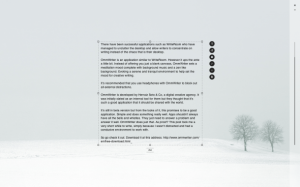Here’s a video put together by my friends over at 3DM. I’ve been a non-traditional seminary student for 7 years, with at least another year to go. What do you think of their argument?
Here’s a video put together by my friends over at 3DM. I’ve been a non-traditional seminary student for 7 years, with at least another year to go. What do you think of their argument?
 Isolation is a term coined by the late Fuller Professor Robert Clinton. It refers to an experience where a leader is removed from a number of things, such as their position of leadership, a sense of God’s presence, a knowledge of calling or direction. Isolation can be chosen, like taking a sabbatical or returning to seminary. It can also be forced on you, like a health problem, imprisonment or getting fired. It can last for weeks, or for years.
Isolation is a term coined by the late Fuller Professor Robert Clinton. It refers to an experience where a leader is removed from a number of things, such as their position of leadership, a sense of God’s presence, a knowledge of calling or direction. Isolation can be chosen, like taking a sabbatical or returning to seminary. It can also be forced on you, like a health problem, imprisonment or getting fired. It can last for weeks, or for years.
My major Isolation experience began when my position on a staff at a megachurch in San Antonio ended. I was out of work for over six months. I was unable to find a suitable ministry position, and eventually ended up in retail. I went from having a place of positional leadership and what seemed like a career track to being alone, with no sense of direction and very little hope.
In studying Isolation as part of the MAGL, I read something from Dr. Clinton that basically went like this:
“Don’t try to be finished with your Isolation until you’ve gotten everything out of it that God wants you to get out of it.”
This floored me, because for two years, I’ve been trying to be getting out Isolation. Unable to find direction, I tried to dive further into spiritual practices. When I felt adrift in depression, I sought to distract myself, and eventually got into counseling to “fix it.” I’ve had to learn what it is to do ministry when it’s not my job. Worst of all, my sense of failure and lack of direction left me unable to even answer the question “what do you want to do?”
But this comment about “getting everything out of Isolation” forced me to reevaluate why I was in such a hurry. If the perfect opportunity fell in my lap tomorrow, would I know what to do with it? Am I mature enough to keep from repeating the mistakes I’ve made in the past? Am I even the kind of person who should be trusted with leadership?
For the first time in almost three years, I am beginning to sense some “movement.” It may be that some new opportunities are on the horizon. But what’s the rush? Maybe I still have something to learn from Isolation.
As I approached the end of my undergraduate experience, I was faced with two realities: my degree hadn’t set me up for a job, and my heart was really in “ministry.” So I moved to my school’s seminary, where I was promptly miserable. I learned a lot from my year with that school (primarily, a music degree does not prepare you to write academic papers), however I couldn’t shake the feeling that I was being prepared to lead churches that only existed in the Bible Belt of the 1950s.
Then I had the opportunity to take an internship with a church in Atlanta, Georgia, and continue to take classes by making occassional pilgrimages to campus. This allowed me to do two things that I could not in when you live and breath academia: being deeply involved in the life of a local church, and deeply committed to relationships with non-Christians. Now this is sad, because I love the classroom, it’s a place where I come alive. But I couldn’t shake the feeling that none of what I was learning had any meaning if I left it relegated to an ivory tower.
So I’ve tried to integrate the seminary into my life. This has been difficult. It’s taken me years to get to the point I am at, and I am a ways from finishing. It’s also been a lonely task. That’s why I’m grateful I found the MAGL.
Fuller Seminary’s Master’s of Arts of Global Leadership has provided a practical way to continue my education in the manner that I feel is best. The program is based on doing everything in a cohort, made up of like minded practioners from around the world. Our course work covers issues like Adult Education, Globalism, Missiology and Self Understanding. All of these are viewed through the lense of helping us develop as leaders, and apply them to our local churches.
The cohort program also offers something that I was unable to find in my previous experiences, a sense of academic and missional cameraderie that my other experiences had lacked. Through the MAGL, I have been reunited with a childhood friend, met a local youth pastor, made friends with missionaries to China, heard first hand accounts of the civil unrest in Liberia and stories of life in undeveloped corners Senegal. As diverse as are cohort is, we find things to laugh and pray about everyday.
But most important, the MAGL has forced us to rethink what God’s really up to in this world. Knowing people scattered across the globe, and wrestling together with them through these issues has a way of making God bigger, and my struggles and pet issues much, much smaller.
That is very difficult. But I’m thankful for it.
I have always read a lot of books. I love having books around and talking about books. I think that bookshelves are the best way to decorate a house. So the idea of digital books didn’t used to be too appealing to me. However, during my trip to Fuller, I was embarrassed to see so many people carrying iPads and Kindles, while I had a second suitcase full of books. This was compounded by a 200 page , two column PDF that I had to read on my Macbook. Partially joking and partially exasperated I tweeted:
This has been a tough summer. In many ways, I feel like God has put me on hold. I’ve been waiting a long time for a lot of things, trying to be faithful with what I do have. But living in between is tough, and it’s worn me down.
The question that comes to mind is “why isn’t God working in my life?” I hear stories of God providing in emergencies, providing opportunities for vocation, or providing little things. It would be a lie to say that God has never worked in my life this way, but it feels like it’s been a long time.
 Last Sunday I was handed a box that had been shipped to an old residence. I wasn’t expecting anything, much less the 1/2 lb. e-ink masterpiece I had been pining for. Shocked, I raced home and dug through my receipts just to make sure I had not accidentally bought it. Nothing. I tore apart the box for a shipping form, and saw my address and a short line that said:
Last Sunday I was handed a box that had been shipped to an old residence. I wasn’t expecting anything, much less the 1/2 lb. e-ink masterpiece I had been pining for. Shocked, I raced home and dug through my receipts just to make sure I had not accidentally bought it. Nothing. I tore apart the box for a shipping form, and saw my address and a short line that said:
#alwaysask
I’ve spent the last week attached to the little gizmo. A co-worker saw me smiling and said: “You look like you’ve got a new girlfriend.” I’ve devoured two books already.
It hasn’t fixed any of the problems that have got me down. But it is a reminder that God is out there, he listens, and other people do, too. I may have some complaints, but I have a good life. While I may still be on hold with God, I feel like he’s letting me know that he hasn’t gone anywhere. He cares. He wants to take care of me. Maybe he’s just waiting for me to let him.
#alwaysask
With the MAGL, the PlantR blog and this one here, I’m doing a lot of writing these days. I’m pretty easily distracted, and my addiction to social interwebs and Netflix doesn’t help. Here’s a few tools that do:
 1. Mindnode A super-simple, super clean mindmapping app. This is where most of my posts, papers, and general life brainstorming takes place.
1. Mindnode A super-simple, super clean mindmapping app. This is where most of my posts, papers, and general life brainstorming takes place.
 2. Scrivener This app is a real workhorse. There are endless uses for it, but I use it primarily for the full screen writing, and for breaking down my writing into small, movable chunks. It’ll store everything you’re working on, give you tools for organizing your thoughts or plots. This is a must-have for any serious writer.
2. Scrivener This app is a real workhorse. There are endless uses for it, but I use it primarily for the full screen writing, and for breaking down my writing into small, movable chunks. It’ll store everything you’re working on, give you tools for organizing your thoughts or plots. This is a must-have for any serious writer.
 3. Ommwriter I’m cheating on Scrivener with Ommwriter. There’s not much too it. It’s a bare bones text editor, with simple text box, a clean backdrop, and synthesized zen-style audiotrack. It turns wordprocessing into an otherworldly experience like playing Myst or Halo back in the day.
3. Ommwriter I’m cheating on Scrivener with Ommwriter. There’s not much too it. It’s a bare bones text editor, with simple text box, a clean backdrop, and synthesized zen-style audiotrack. It turns wordprocessing into an otherworldly experience like playing Myst or Halo back in the day.
4. Antisocial This little app enforces the self-control I can’t seem to muster on my own. It blocks access to most of the social media I use to delay writing.
Workflow:
If you want to read a blogger who really knows his stuff when it comes to apps and workflow, check out John Chandler.